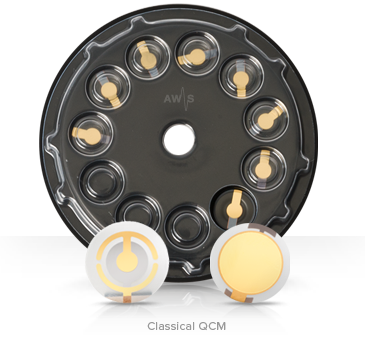Advanced Acoustic Sensing Technology
AWSensors offers a wide variety of acoustic sensors including traditional QCM, HFF-QCM (High Fundamental Frequency), and Love-SAW types. Our sensors are compatible with AWSensors and other QCM and QCMD instruments, providing flexibility for your research needs.
QCM Technology Overview
Quartz Crystal Microbalance (QCM) with dissipation measurement (QCMD) is a sensing technique that relies on measuring resonance properties of piezoelectric resonators. QCM sensors consist of a thin piece of quartz confined between a pair of metal electrodes, where an alternating current applied to the quartz crystal induces mechanical oscillations due to the piezoelectric effect.
High Fundamental Frequency QCM Sensors
HFF-QCM sensors have higher sensitivity than classical sensors because sensitivity depends on the resonance frequency. The improvement is approximately two orders of magnitude. Since the sensing area of the electrode is also reduced, HFF-QCM operates with much smaller sample volumes. AWSensors is unique in supplying commercial HFF QCM sensors and appropriate accessories for their use in measurement instruments.
Love-SAW Sensors
Love-SAW sensors consist of a thicker quartz piezoelectric substrate with an interdigitated transducer (IDT) on one end of the surface acting as signal input, and a second one on the other end acting as output. An alternating current applied to the input transducer generates a mechanical wave which propagates along the sensor device from input to output port.
Applications and Benefits
Our sensing technology enables sensitive, real-time, label-free monitoring of interactions at interfaces, including adsorption and desorption processes, molecular interactions, and protein conformational changes. The technology enables measurement and tracking of adsorption, cross-linking, aggregation, swelling, dissolution, corrosion and other interface molecular phenomena.

